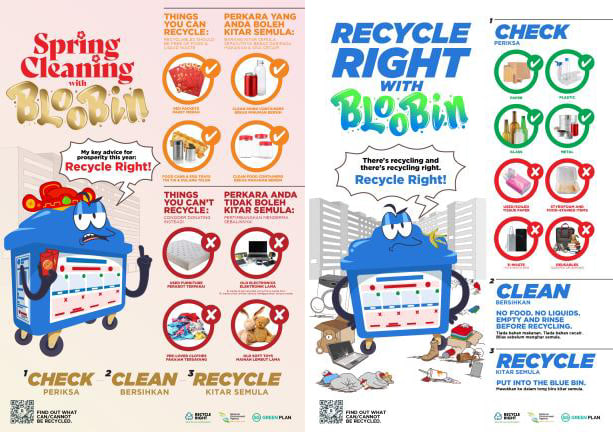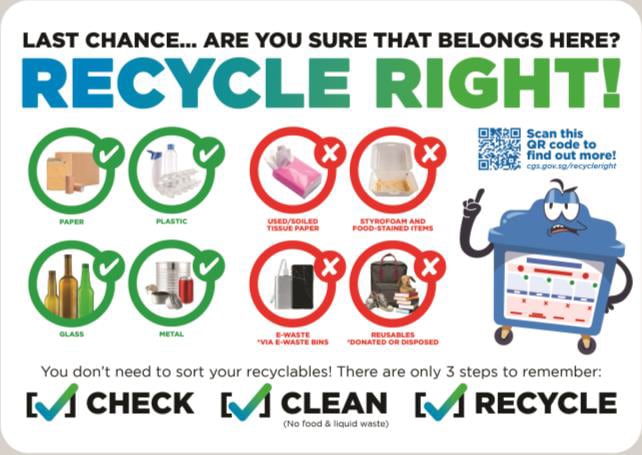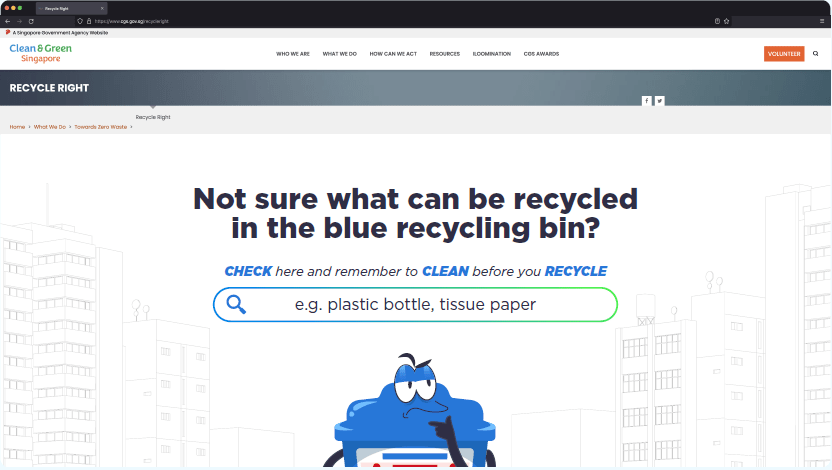Three in five households recycled regularly: NEA survey
SINGAPORE: While three in five households reported that they recycled regularly and that most knew what items could be placed in recycling bins, households were less aware of items that should not be deposited for recycling, the National Environment Agency (NEA) said on Friday (Jan 14).
In its latest survey on household recycling conducted last year, NEA said that it saw other positive findings, which come as the country aims for a 70 per cent overall recycling rate by 2030 under the Zero Waste Masterplan and the Singapore Green Plan 2030.
Eight out of 10 households were aware that recyclables collected from blue recycling bins and recycling chutes were sorted at central sorting facilities - this was an improvement from 57 per cent in 2018.
About 6 per cent of households had the misconception that recyclables were mixed with general waste and incinerated, down from 12 per cent in 2018.
Most households were aware that common recyclables generated at home, such as shampoo or detergent bottles, beverage cartons, glass bottles and plastic egg cartons could be placed into the blue recycling bins.
However, households were less aware of items that should not be deposited for recycling. For instance, about half of those surveyed thought that soft toys and Styrofoam items could be recycled.
The survey also found that 72 per cent were not aware that households did not need to sort their recyclables before depositing them into the blue recycling bins or recycling chutes.
"To make recycling more convenient for households, Singapore has a single-stream recyclables collection system where households can place four types of recyclables – paper, plastic, glass and metal – into recycling bins and recycling chutes," said NEA.
"This not only saves on the effort for households to segregate recyclables at home, but also reduces the carbon footprint of collecting recyclables, when compared to the multiple truck trips needed for the separate collection of different recyclable streams."
The agency noted that if Singapore does not reduce waste generation, Semakau Landfill is expected to be full by 2035 given the country's current rate of waste disposal.
"Through recycling, we can not only divert waste from Semakau Landfill, but can also turn trash into treasure and close the resource loop as part of a circular economy."
Currently, all HDB blocks have one recycling bin per block or a recycling chute, while landed houses each have a dedicated recycling bin.
At condominiums and private apartments, one recycling bin is also provided for each residential block. These bins, as well as the dedicated recyclables collection trucks, are all coloured blue to differentiate them from the general waste bins and the refuse collection trucks.
Related:
NEW RECYCLING MASCOT
This year's recycling campaign will introduce a new recycling mascot named Bloobin - a disgruntled blue recycling bin "frustrated by the years of contamination, and on a mission to educate the public on how to recycle right".
"20 years ago, Bloobin started out as a dreamer full of hope. He believed that when everyone banded together to recycle, we could create a greener Singapore with less waste sent to Semakau Landfill," reads Bloobin's origin story.
"Over the years, however, Bloobin felt that Singapore’s recycling rate showed insufficient improvement. And he became increasingly frustrated, due to constant bin contamination … and it was breaking his heart. People had been treating the blue recycling bins as trash bins and he has finally had enough of the years of abuse and misuse!
"So Bloobin is now on a mission to get everyone to recycle right, which will help increase recycling rates and extend the lifespan of Semakau Landfill."

Bloobin stickers at general waste and recycling chutes at public housing developments will serve as a "last-mile reminder" to nudge households to check their items before appropriately disposing of them as general waste or recyclables, said NEA.
To nurture proper recycling habits, interactive educational resources such as an e-activity book for pre-schoolers and e-games for older students will be made available.
An Inter-Institutes of Higher Learning challenge - Ready, Set, Recycle - will be launched to mobilise youth to take action for recycling and develop deeper and more meaningful engagement programmes.


NEA COLLABORATIONS
On Friday, NEA said it is collaborating with the community, non-Governmental organisations, corporate and industry partners to encourage the public to recycle more and recycle right, and to explore and implement new methods of making recycling convenient in neighbourhoods and homes.
It will also work with local Public Waste Collectors to distribute a recycling receptacle to each household in 2022 in a bid to nudge households to step up their recycling efforts.
More details will be announced at a later stage, said the agency.
NEA highlighted an ongoing trial of using transparent recycling bins at Hong Kah North Single Member Constituency and East Coast Group Representative Constituency to facilitate an intuitive and informed recycling process amongst the public.
"The establishment of a Producer Responsibility Scheme for regulated e-waste on Jul 1, 2021, resulted as well in the setting up of dedicated e-waste bins around the island and the scheduling of e-waste collection drives at housing estates, making the recycling of such waste more convenient," it said.

















